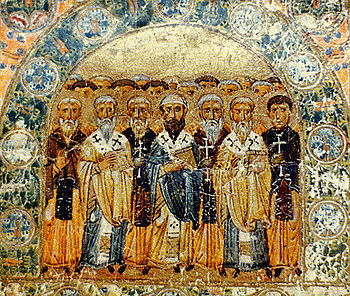Ignatius
of Antioch, Cyril of Alexandria, Tertullian of Carthage, and Athanasius of
Alexandria.
As you
read this list you might be asking yourself: Who are these men? Are they important,
or are they just names from the past? While these men are not household names
in the 21st century, they were significant in the early days of the Church.
And as I have been immersed in early Christian doctrine (1st-5th
centuries A.D.) over the past 3 months for a PhD seminar, I was reminded that the
past is a valuable teacher for us in the present. In fact, there is much that
we can learn from the early centuries of the Christian Church, and some of the
lessons we can learn might surprise you.
One
example of this is found in the controversy between Augustine (A.D. 354-430)
and Pelagius (A.D. 354-420). If you are familiar with these two historical
figures, it may seem strange to you that the controversy between them actually provides
valuable instruction for 21st century parents. While their debate
was not about parenting, their differences regarding the doctrine of sin,
specifically the relationship between human responsibility and the effects of
living in a fallen world, are two ideas that shape the way we live our lives
and parent our children.
On one
hand, there is Augustine, who believed in the doctrine of original sin, which
is the idea that every man begins life in the grip of an unshakable power that
will draw him deeper and deeper into destruction unless God rescues him.[1]
He taught that while sin’s grip is unyielding, humans are still responsible for
their wrong-doing. Augustine believed that when Adam sinned in the Garden,
everyone sinned with him (See Genesis 3 & Romans 5). To summarize
Augustine: man sins, because man is a sinner by nature, and the only escape
from sin is the grace of God.
On the
other hand, Pelagius did not believe in the doctrine of original sin.[2]
Instead he developed a system of unconditional free will, which allows every man
to freely choose to do right or to do wrong. For Pelagius, everyone is born a
blank slate, unsoiled by original sin. He did not deny that we are born into a
fallen world and that this fallen world influences our lives, but he did
believe that every man has the power and the will to freely choose good or
evil.[3]
For Pelagius, salvation depends upon good works, and he assumed that the
provision of a good environment would directly influence man for the better.[4]
When
Pelagius’ position is applied to parenting, it’s easy to believe that if we
simply place our children in the right environment they will thrive. If we keep
our children from mingling with the pagans, they will live a good and moral
life, and they will grow to love the Lord all the more. If only we can control
their environment, then we can remove the temptation to sin. I mean, the odds
of our children becoming tainted by this fallen world grow dim if we don’t
allow our children to watch certain television shows, if we don’t allow
non-believers to come into our homes and influence our children, and if we
don’t allow our children to play video games, right?
Wrong. This
is moralism, and this teaching negates our desperate need for God’s grace to
save us. Besides it’s not the environment that causes us to sin; we sin, as
Augustine said, because we are sinners.
Now, don’t hear me wrong, I do agree with
Pelagius that the environment in which we live and raise our children matters,
but if we remove original sin from the equation then we will just raise
moralists, which is exactly what Pelagius was.[5]
Yes, there are grave effects of living in a fallen world, but even if
everything around us was pure and sacred we would nevertheless defile it
because we are sinners. Jeremiah 17:9 teaches us, “The heart is deceitful above
all things, and desperately sick; who can understand it?”
Although it is important for us to provide a
good environment for our children so that they might flourish, if we live in
fear that this fallen world will stain our children and if we forsake our responsibility
to be a light to the world, we have
missed the mark. Besides, let’s face it, our children are already stained and
have been since conception (Psalm 51:5). A good environment will not save them.
In fact, God has called to Himself countless men and women who were raised in some
of the worst environments known to man.
While we must fight for holiness in our homes,
we must also remember Augustine’s teaching that we desperately need the grace
of God to free us from the death-grip of sin. So, let us raise our children to
see their desperate need for God to free them from their wicked, deceitful
hearts, instead of sheltering them from this fallen world. Just like us, the
greatest need in the lives of our children is redemption. So, while we seek to
provide the best possible environment for our children let us constantly point
them to the only medicine for their soul, the Savior of sinners, Jesus Christ.
~Corey
[1]Justin S. Holcomb, Know the Creeds
and Councils (Grand Rapids, MI: Zondervan, 2014), 89.
[2]Pelagius,
a strict moralist, rejected Augustine’s position that man was “not able not to
sin”.
[3]J. N. D. Kelly, Early Christian
Doctrines (New York: HarperOne, 1978), 357-58.
[4]Peter R. L. Brown, Augustine of
Hippo: A Biography (Berkeley: University of California Press, 2013), 374.
[5]Pelagius
was deemed a heretic and his teaching has been rejected by the church, even to
this day.
